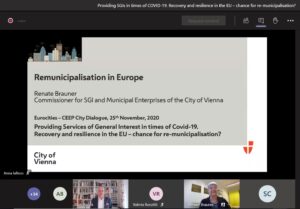Services of General Interest (SGI) employ over 60 million workers in a broad range of sectors. Likewise, they contribute to approx. 26% of the EU’s Gross Domestic Product (GDP). Furthermore, SGIs represent a large share of essential tasks that remained operational during lock-downs in the COVID-19 pandemic. Keeping this in mind, the on-going pandemic proves once more, that we need stable and high-quality services in sectors such as energy, health, mobility, logistics, social and public housing.
Against this background, EuroCities organised a City Dialogue on Public Services and Services of General Interest in cooperation with the European Centre of Employers and Enterprises (CEEP) on the 25th of November 2020.
Services of General Interest: Source of revenue or resilience?
Services such as energy supply, mobility and logistics, health care or affordable housing are services considered to be of general interest. Their functioning is vital for society and proved all the more essential in times of crisis. Yet, in many countries and cities, these services struggle with under-funding. Furthermore, in the past four decades these traditionally publicly owned services were privatised with the aim to get more efficient or to create revenues for the public budget. In Central and Eastern Europe post-socialist economic recovery plans triggered this development even more.
The COVID-19 pandemic showed how essential the provision of services of general interest are in order to get cities through a severe crisis without cutting down on quality or scope. Likewise, they are essential in building long-term economic and social resilience.
However, in view of the financial crisis that many countries and municipalities will face in the aftermath of the pandemic, privatising services of general interest might seem a lucrative option in order to close holes in the budget.
In contrast, the EuroCities Dialogue aimed at taking a closer look at the process of remunicipalisation as a response to the pandemic. After a long phase of liberalisation and privatisation of public service provisions, public authorities in several member states remunicipalised services of general interest. This can be a unique chance to improve the quality of services and better incorporate social and ecological targets for a sustainable and resilient recovery.
Making the case for remunicipalisation

The city of Vienna published a study on remunicipalisation of services of general interest. In doing so, the city authority in Vienna aimed at collecting evidence on developments, motives and practical examples for services of general interest run by public authorities.
The study analyses the economic relevance of the municipal sector by looking at various aspects such as pre-conditions for the productivity of public capital, role of public capital for regional development or growth mechanisms at local and regional level.
In the subsequent part of the study, the authors are elaborating on the motives for remunicipalisation, ranging from private market failure to political-strategic and financial.
Finally, the study presents municipal case studies from different sectors such as water supply, energy supply, waste disposal, mobility and care.
Links




